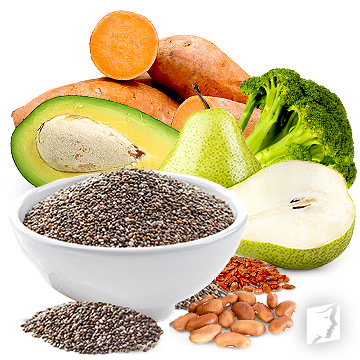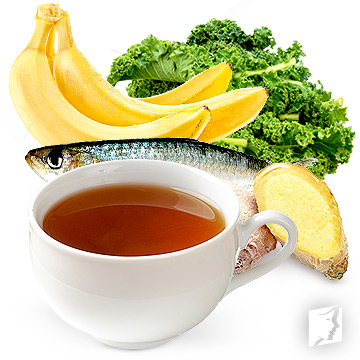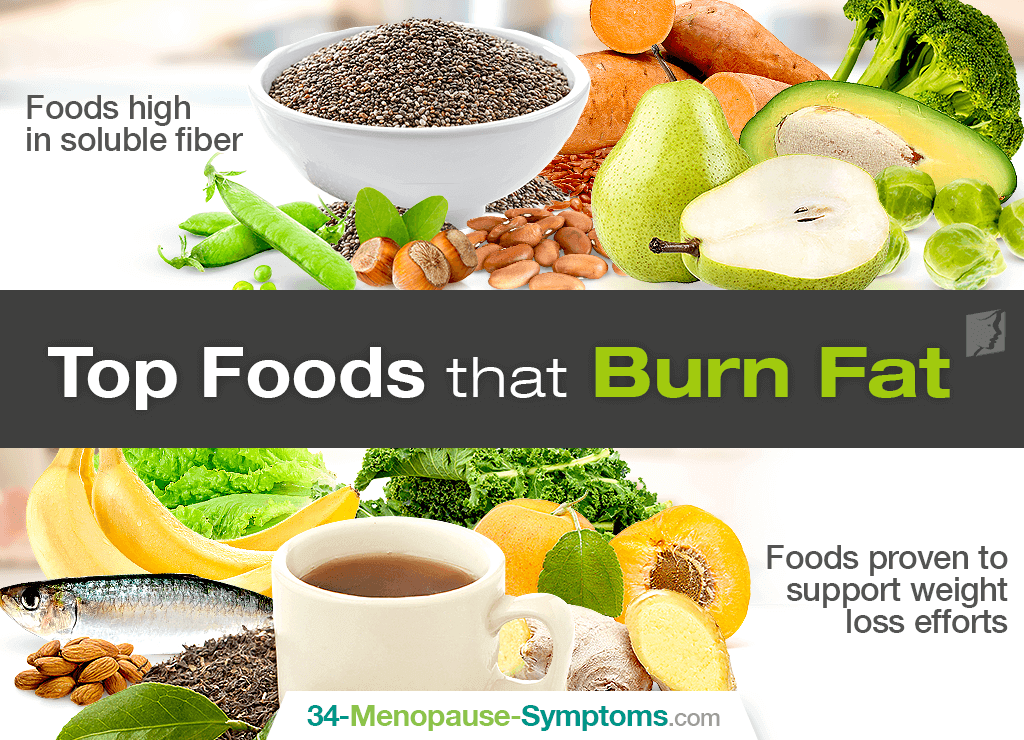Weight gain is one of the most common complaints of women as they grow older. It is extremely common for those going through the menopausal transition due to various hormonal changes occurring in their bodies. Continue reading to learn about top foods that burn fat to keep the pounds off as you progress through the years.
Which are the Top Fat Burning Foods?
No matter your age, weight gain is not only to be blamed on hormones, but one's diet as well. As such, here are some of the best foods to incorporate into your fat burning diet:
Foods High in Soluble Fiber
Research suggests that by consuming foods high in soluble fiber can promote weight loss by keeping you fuller for longer and increasing insulin sensitivity. Some foods high in soluble fiber include:

Nuts and seeds: flaxseed, chia seeds, pumpkin seeds, hazelnuts
Legumes: lentils, peas, black beans, lima beans, kidney beans
Fruits: pears, avocados, plums, apples, apricots, nectarines
Vegetables: Brussels sprouts, sweet potatoes, broccoli, turnips
Foods Proven to Support Weight Loss Efforts
Active ingredients found within the following foods can support women's fat burning efforts through the following methods:

Speed up metabolism: Chili peppers (capsaicin); coffee and tea (caffeine and catechins); apple cider vinegar; seaweed (iodine)
Reduce water retention: bananas, apricots, avocados, and raisins (rich in potassium); green veggies, nuts, and seeds (high in magnesium); ginger tea
Burn fat: collard greens, kale, sardines, skim milk, whey protein, beans, lentils, plain low-fat yogurt, ricotta cheese, almonds (all rich in calcium)
Overall, there is no one diet that suits all women equally. The best fat burning diet incorporates aforementioned fiber-rich and fat burning foods and is also one in which calories are cut.
How to Watch Calorie Intake
In order to lose weight, women need to keep track of calorie intake, which can be done by choosing quality foods from various groups. Consuming regular, balanced meals consisting of complex carbohydrates, healthy fats, and lean protein will take longer to digest, thus helping you control appetite and any cravings for simple sugars.
Complex Carbohydrates
- Whole grains: oatmeal, brown rice, whole wheat bread
- Vegetables: yams, sweet potatoes, squash, pumpkin
- Legumes: lentils; split peas; garbanzo, white, pinto, or black beans
Healthy Fats
- Oils: avocado, olive, sesame
- Nuts: almonds, peanuts, pecans, cashews, macadamia, walnuts
- Fatty fish: sardines, herring, trout, mackerel, tuna, salmon
Lean Protein
- Legumes: soy, lentils, peas, chickpeas, beans
- Nuts: almonds, pistachios, cashews, walnuts, pine nuts, Brazil nuts
- Meat: lean cuts of fish, chicken, pork, beef, or turkey
Also, consuming protein reduces muscle loss when you're shedding the pounds. This is especially important for perimenopausal women, whose loss of muscle mass can decrease the rate at which their bodies use calories.
Also Consider Exercise
Also, women should complement fat burning diets with exercise for improved results. Weight loss only starts to occur when total calorie consumption is less than that burned during physical activity.
Perform moderate aerobic exercises - like brisk walking - at least 150 minutes a week or vigorous aerobic activity - like dancing or jogging - for at least 75 minutes weekly. For optimum results, incorporate strength training, such as yoga or weight lifting, into your routine twice a week as well, and check out some additional healthy tips that make weight loss easy.
Key Takeaways
All in all, the best fat burning diet for all women is that which is high in soluble fiber as well as packed with foods proven to support weight loss efforts. Also, try to control the amount of calories you consume on a daily basis by consuming regular, balanced meals of complex carbohydrates, healthy fats, and lean protein while cutting down on simple sugars.
For further holistic weight loss options, continue reading more about weight gain treatments to finally get back on the path to a healthier, lighter you.
Sources
- Clarke, G. (2012). Losing Water Weight. USA: CATEK International. Available from Google Books.
- Diepvens, K. et al. (2007). Obesity and thermogenesis related to the consumption of caffeine, ephedrine, capsaicin, and green tea. American Journal of Physiology: Regulatory, Integrative and Comparative Physiology, 292(1), R77-R85. doi: 10.1152/ajpregu.00832.2005
- Mayo Clinic. (2016). Menopause weight gain: Stop the middle age spread. Retrieved August 21, 2018, from https://www.mayoclinic.org/healthy-lifestyle/womens-health/in-depth/menopause-weight-gain/art-20046058
- MedlinePlus. (2018). Soluble vs. insoluble fiber | Complex carbohydrates. Retrieved August 21, 2018, from https://medlineplus.gov/ency/article/002136.htm | https://medlineplus.gov/ency/imagepages/19529.htm
- National Osteoporosis Foundation. (n.d.). A Guide to Calcium-Rich Foods. Retrieved August 21, 2018, from https://www.nof.org/patients/treatment/calciumvitamin-d/a-guide-to-calcium-rich-foods/
- The North American Menopause Society. (2018). Midlife Weight Gain - Sound Familiar? You're Not Alone. Retrieved August 21, 2018, from https://www.menopause.org/for-women/menopause-take-time-to-think-about-it/consumers/2018/01/23/midlife-weight-gain-sound-familiar-you-re-not-alone
- Rains, T.M. (2015). A randomized, controlled, crossover trial to assess the acute appetitive and metabolic effects of sausage and egg-based convenience breakfast meals in overweight premenopausal women. Nutritional Journal, 14, 17. doi: 10.1186/s12937-015-0002-7.
- Rashmi, M. et al. (2014). Thyroid Hormone Regulation of Metabolism. Physiological Reviews, 94(2), 355-382. doi: 10.1152/physrev.00030.2013
- Wanders, A.J. et al. (2011). Effects of dietary fibre on subjective appetite, energy intake and body weight: a systematic review of randomized controlled trials. Obesity Reviews: An Official Journal of the International Association for the Study of Obesity, 12(9), 724-739. doi: 10.1111/j.1467-789X.2011.00895.x.
- Whiting, S. et al. (2012). Capsaicinoids and capsinoids. A potential role for weight management? A systematic review of the evidence. Appetite, 59(2), 341-348. doi: 10.1016/j.appet.2012.05.015.




